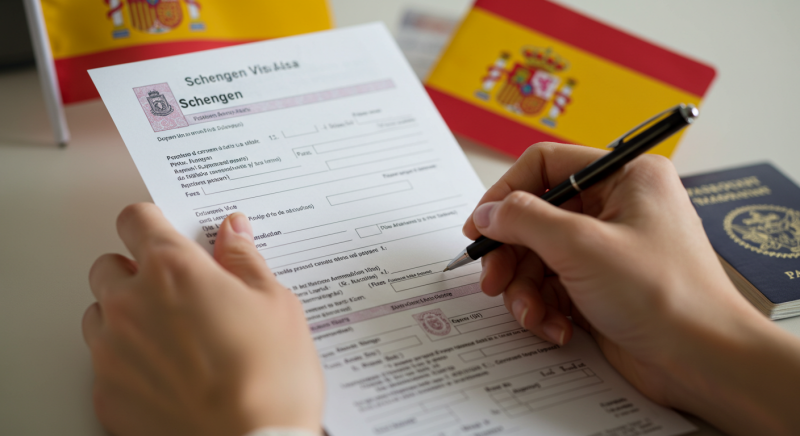Embarking on a journey to Spain in 2025 is an exciting prospect, filled with the allure of vibrant cultures, historic landmarks, and picturesque landscapes. However, navigating the requirement for Spain travel visa can be daunting, especially with recent changes in travel regulations. This guide aims to demystify the process, providing you with clear, up-to-date information to ensure a seamless travel experience.
Key Takeaways on the Requirement for Spain Travel Visa
-
ETIAS Authorization: Mandatory for visa-exempt travelers starting in late 2026; apply online with a €7 fee.Investopedia+5Wikipedia+5Latest news & breaking headlines+5
-
Enhanced Data Collection: Be prepared to provide extensive personal information when booking accommodations or renting vehicles in Spain.Travel and Tour World+1Latest news & breaking headlines+1
-
Schengen Visa Application: Non-exempt travelers must apply for a visa, ensuring all documentation is complete and accurate to avoid delays.
-
Financial Proof: Demonstrate sufficient funds to cover your stay, typically €100–€150 per day.travpa.com+2ForeignWay+2Find Something to Read+2
-
Travel Insurance: Obtain coverage with a minimum of €30,000 for medical emergencies, valid throughout the Schengen Area.ForeignWay+2Find Something to Read+2travpa.com+2
Understanding the Requirement for Spain Travel Visa
The requirement for Spain travel visa varies depending on your nationality, the purpose of your visit, and the duration of your stay. Spain, as a member of the Schengen Area, follows the common visa policy, allowing for short-term stays of up to 90 days within a 180-day period. However, recent developments have introduced new procedures and systems that travelers must be aware of.Find Something to Read

Types of Spain Visas and Their Purposes
When it comes to traveling to or staying in Spain, your purpose will determine the type of visa you need. Spain, as a member of the Schengen Area, offers different types of visas depending on the nature and duration of your visit. Understanding each visa type helps ensure you meet the right requirement for Spain travel visa and avoid unnecessary delays or rejections.
1. Schengen Visa (Short-Stay Visa – Type C)
Purpose: Tourism, business, visiting family/friends, short courses, conferences, or medical treatment.
This is the most common visa for travelers planning to stay in Spain for up to 90 days within a 180-day period. It allows access not just to Spain but to all 27 countries in the Schengen Zone. The visa can be single-entry, double-entry, or multiple-entry depending on your travel needs.
2. Airport Transit Visa (Type A)
Purpose: Transit through a Spanish airport without entering the Schengen Area.
If you’re flying through a Spanish airport en route to a non-Schengen destination and you’re from a country that requires this type of visa, this is what you’ll need. You won’t be allowed to leave the international transit area of the airport.
3. National Visa (Long-Stay Visa – Type D)
Purpose: Studying, working, family reunification, long-term residence.
For those planning to stay in Spain for more than 90 days, this visa is required. You’ll apply for it based on your specific reason for staying. Once in Spain, long-stay visa holders often must apply for a residence permit.
4. Student Visa
Purpose: Pursuing full-time studies, academic exchange programs, internships, or language courses longer than 90 days.
This falls under the long-stay category but is specific to educational purposes. Depending on the program’s length, the visa may be valid for several months or years and can be extended.
5. Work Visa
Purpose: Engaging in paid employment or professional activity in Spain.
To apply for this visa, you generally need a job offer or a work contract from a Spanish company. The employer typically initiates the process through Spain’s immigration office before the visa is issued.
6. Self-Employment or Freelance Visa (Autónomo Visa)
Purpose: Starting a business or working as a freelancer or independent professional.
Applicants must present a solid business plan, proof of income, and qualifications relevant to the profession. This is a great route for entrepreneurs or remote workers who want to legally work from Spain.
7. Non-Lucrative Residence Visa
Purpose: Living in Spain without engaging in any professional or paid activity.
Often chosen by retirees, digital nomads, or people with sufficient savings or passive income, this visa requires you to demonstrate financial self-sufficiency and valid health insurance. It’s ideal for those seeking a quieter life in Spain without working.
8. Family Reunification Visa
Purpose: Joining a family member who is legally residing in Spain.
This visa allows spouses, children, and sometimes dependent parents of residents or citizens of Spain to reunite and live together legally. It requires proof of the family relationship and financial stability.
9. Golden Visa (Investor Visa)
Purpose: Residency through significant financial investment.
Applicants must invest at least €500,000 in Spanish real estate or meet other qualifying investments such as company shares or public debt. In return, they are granted residency with fewer stay requirements and a path to permanent residence.
10. Seasonal Work Visa
Purpose: Temporary employment in agriculture, hospitality, or other seasonal sectors.
This visa is for non-EU nationals hired for short-term jobs during peak work seasons. It’s valid for the duration of the work contract and includes conditions for return to your home country after the contract ends.
ETIAS: A New Layer in the Requirement for Spain Travel Visa
When planning a trip to Spain, most travelers think about the exciting parts first — tasting tapas under the sun, walking through ancient cathedrals, or strolling the charming streets of Madrid. But before any of that can happen, it’s important to understand the requirement for Spain travel visa, especially now that a new step has been introduced: ETIAS.
ETIAS stands for the European Travel Information and Authorization System. While it’s not a traditional visa, it is now an essential part of the process for many people visiting Spain. If you’re from a country that previously allowed you to enter Spain without a visa for short visits — like the U.S., U.K., Australia, or Canada — you’ll now need to apply for an ETIAS authorization before you can travel. This new system has been introduced to increase safety across European borders and streamline who enters the Schengen Area, which includes Spain.
So how does this impact you? In short, ETIAS adds an extra, but manageable, step to the requirement for Spain travel visa for those visiting for up to 90 days. The good news is that it’s a quick and simple process. You won’t need to visit a consulate or collect piles of paperwork. Everything happens online.
You’ll fill out a short application with basic information: your full name, date of birth, passport details, your travel plans, and answers to a few questions about your background. Once submitted, your information will be checked against various European security systems to make sure everything looks good. In most cases, approval is given within minutes, although it’s recommended to apply at least several days — or ideally a few weeks — before your trip, just in case.
Once approved, your ETIAS will be valid for three years, or until your passport expires, whichever comes first. During that time, you can visit Spain and any other Schengen country as many times as you want, so long as you don’t stay more than 90 days in any 180-day period. That makes it a flexible solution for regular travelers, business visitors, or anyone in love with Spanish culture who plans to return more than once.
It’s important to remember that while ETIAS might seem like a small change, it’s now a core part of the requirement for Spain travel visa. Without it, even travelers from visa-exempt countries can be turned away at the airport. That’s why it’s crucial to check your eligibility and get your ETIAS in advance. Missing this step can lead to last-minute stress — or worse, a cancelled trip.
As you get ready for your Spanish getaway, include ETIAS on your checklist. It’s a minor detail, but one that carries big weight. With it, you’re not just meeting the requirement for Spain travel visa, you’re also stepping into Spain with peace of mind, knowing all your documents are in order.
So whether you’re planning to catch a Real Madrid game, hike the Camino de Santiago, or simply sip sangria by the Mediterranean Sea, don’t forget ETIAS. It’s your digital key to unlocking one of Europe’s most unforgettable destinations
Spain’s Enhanced Data Collection: Impact on the Requirement for Spain Travel Visa
In addition to ETIAS, Spain has implemented new data collection regulations affecting travelers. As of December 2, 2024, tourists are required to provide extensive personal information when booking accommodations or renting vehicles. This includes over 40 data points for hotel bookings and up to 60 for car rentals, encompassing sensitive details such as banking information and relationships with fellow travelers. This data is stored for up to three years and aims to bolster security measures.Latest news & breaking headlines+1Travel and Tour World+1Travel and Tour World+1Latest news & breaking headlines+1
Applying for a Schengen Visa: Meeting the Requirement for Spain Travel Visa
Traveling to Spain can be the fulfillment of a lifelong dream — a chance to wander through centuries-old castles, relax on sun-kissed beaches, and immerse yourself in the passionate rhythm of Spanish life. But before you pack your bags and book your flight, understanding how to apply for a Schengen visa is a crucial step in meeting the requirement for Spain travel visa, especially for travelers from countries that don’t enjoy visa-free access.
Unlike those from visa-exempt nations who only need ETIAS authorization, others must go through the traditional visa process. The Schengen visa is the standard short-stay visa that allows visitors to enter not only Spain but also 26 other countries in the Schengen Area for up to 90 days within a 180-day period. This visa is your formal entry pass to experience the vibrant cities, scenic countryside, and rich culture Spain is known for.
The journey to meeting this requirement for Spain travel visa begins with choosing the right visa type. If you’re going for tourism, visiting friends or family, attending a business event, receiving medical treatment, or even studying short-term, you’ll need to apply under the corresponding category. Each one may have slightly different requirements, but the overall process is similar.
To start, you’ll need a valid passport — make sure it’s not close to expiring, as it must be valid for at least three months beyond your planned stay. Next, complete the visa application form carefully and truthfully. Any inconsistencies or errors can delay or even result in denial. Along with the application, you’ll submit recent passport-sized photographs, proof of your travel itinerary (such as flight bookings), hotel reservations, and travel insurance. The insurance must cover at least €30,000 in medical expenses and be valid throughout the Schengen zone.
One of the most important parts of the requirement for Spain travel visa is showing proof of sufficient financial means. Spain wants to ensure that travelers can support themselves during their stay. This usually means providing recent bank statements, pay slips, or proof of income. On average, Spain requires visitors to have between €100 to €150 per day of their intended stay, depending on their accommodation and plans.
Once your documents are in order, you’ll schedule an appointment with the nearest Spanish consulate or embassy. During your visa interview, you’ll present your application and supporting documents and answer a few questions about your travel plans and background. It’s natural to feel a little nervous, but the interview is simply part of the process — be honest and clear, and you’ll be fine.
After submitting your application, the wait begins. Processing time usually takes about 15 calendar days, though it can vary depending on the season and your personal circumstances. That’s why it’s recommended to apply at least a month before your trip. If everything checks out, you’ll receive a visa sticker in your passport — a small document, but a big key to unlocking your Spanish adventure.
Successfully applying for a Schengen visa is more than a formality — it’s your official green light to explore the history, cuisine, and beauty of Spain. From the moment you step off the plane, all your effort in meeting the requirement for Spain travel visa will have paid off. You’ll arrive not just with luggage, but with peace of mind, knowing you followed the right steps and are free to enjoy everything Spain has to offer.
So, if you’re from a country that needs a Schengen visa, don’t see the process as a burden — see it as the beginning of your journey. Each document you gather, each form you fill out, is a step closer to experiencing flamenco in Seville, art in Barcelona, or sunsets in Ibiza. Understanding and fulfilling the requirement for Spain travel visa ensures that nothing stands between you and the trip of a lifetime

Frequently Asked Questions
1. Do I need a visa to travel to Spain in 2025?
If you’re from a visa-exempt country, you won’t need a visa for short stays but will require ETIAS authorization starting in late 2026.
2. What is ETIAS, and how does it affect me?
ETIAS is an electronic travel authorization for visa-exempt travelers, enhancing security and border management.
3. How do I apply for a Schengen visa to Spain?
Submit your application to the Spanish consulate or embassy, providing all required documents and paying the applicable fee.
4. What documents are needed for a Schengen visa application?
A completed application form, valid passport, photographs, travel itinerary, proof of accommodation, travel insurance, and financial proof.ForeignWay+3travpa.com+3VisaHQ+3
5. How long does it take to process a Schengen visa?
Processing times vary but generally take up to 15 calendar days.Schengen Visa Ltd
6. What are the financial requirements for a Schengen visa?
You must demonstrate sufficient funds, typically €100–€150 per day of stay.Find Something to Read+2ForeignWay+2travpa.com+2
7. Is travel insurance mandatory for a Schengen visa?
Yes, with a minimum coverage of €30,000 for medical emergencies, valid throughout the Schengen Area.travpa.com+2Find Something to Read+2ForeignWay+2
8. What is the validity period of a Schengen visa?
Short-stay visas allow for stays up to 90 days within a 180-day period.Wikipedia+4Find Something to Read+4Schengen Visa Ltd+4
9. Can I extend my stay in Spain beyond the visa period?
Extensions are granted only in exceptional circumstances; otherwise, overstaying can lead to penalties.
10. Where can I find more information on Spain’s visa requirements?
Visit the official website of the Spanish consulate or embassy in your country for the most accurate and up-to-date information.
-
Spain Ministry of Foreign Affairs – Official information on visa policies and requirements for Spain:
https://www.exteriores.gob.es/en -
ETIAS (European Travel Information and Authorization System) – Learn more about ETIAS and how to apply:
https://travel-europe.europa.eu/etias_en -
Schengen Visa Info – Comprehensive resource for Schengen visa applications and requirements:
https://www.schengenvisainfo.com/spain-visa/ -
Official EU Immigration Portal – Visa policy details and application support for all Schengen countries:
https://immigration-and-home-affairs.ec.europa.eu/policies/legal-migration/visa-policy_en -
VisaHQ – Spain Visa Services – Third-party visa application support and tools:
https://www.visahq.com/spain/ -
Spain Tourism Official Site – General travel and tourism information for Spain:
https://www.spain.info/en/ -
European Commission – ETIAS FAQ – Answers to common questions about ETIAS implementation:
https://home-affairs.ec.europa.eu/policies/schengen-borders-and-visa/visa-policy/etias_en -
Spain Embassy Directory Worldwide – Find the nearest Spanish consulate or embassy:
https://www.embassypages.com/spain -
IATA Travel Centre – Official travel regulations and visa requirement tool:
https://www.iatatravelcentre.com/ -
Schengen Visa Calculator (Official Tool) – To track your 90/180-day Schengen travel eligibility:
https://ec.europa.eu/assets/home/visa-calculator/calculator.htm?lang=en

